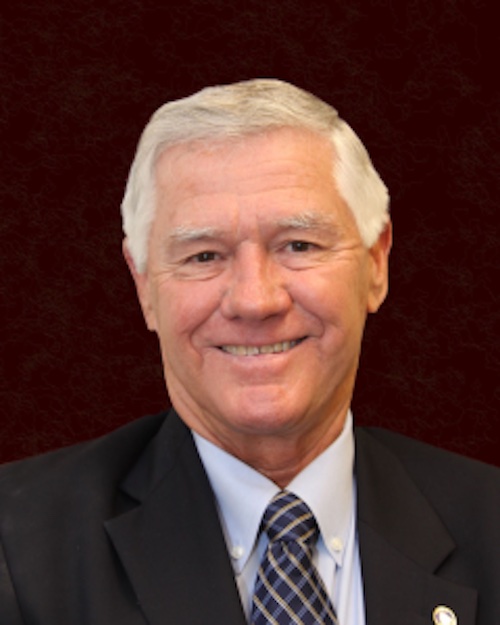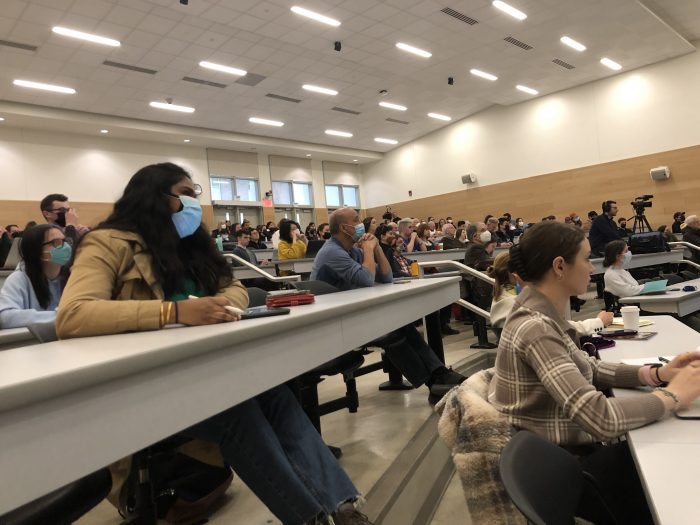Debate around the future of the Port Jefferson Country Club intensified on Monday, April 4, when longtime local residents confronted the Village of Port Jefferson Board of Trustees during a public session.
Myrna Gordon and Michael Mart both condemned the board for moving ahead with plans to curb coastal erosion at East Beach without first holding a public forum, arguing that an issue of this magnitude requires greater public input. “The bluff touches every resident … and there should be a public forum for this,” Mart said. Gordon added, “This is an important issue in this village … and on this particular issue, the ball was dropped.”
Responding to these charges, Mayor Margot Garant said the bluff projects are time sensitive, requiring prompt action on behalf of the village before its permits expire.
“This is an area regulated by the Army Corps of Engineers and the [Department of Environmental Conservation],” Garant said. “The window of opportunity is closing because our permits are not going to be there forever.”
History of the country club
Philip Griffith, historian of PJCC and co-editor of Port Jefferson historical society’s newsletter, chronicled the history of the country club since 1908. According to Griffith, the club originated as a nine-hole golf course designed for the residents of Belle Terre.
In 1953 Norman Winston, a wealthy real estate developer, purchased 600 acres of land in Belle Terre and added nine more holes, establishing the Harbor Hills Country Club. In 1978 Mayor Harold Sheprow leased the Harbor Hills club for $1 and in 1980 village residents approved the purchase of the property for $2.29 million by voter referendum. In 1986 the club was renamed the Port Jefferson Country Club at Harbor Hills.
“The club is 114 years old and it is not private anymore,” Griffith said in a phone interview. “Once the village took it over, it opened membership to all residents of Port Jefferson. Membership pays a fee and they operate the club not by using the residents tax money, but by membership dues paid to the country club.”
Due to the erosion of East Beach, the clubhouse, which sits along 170 acres of village property with golf, tennis and parking facilities, is in danger of falling down the slope. Village residents and elected officials are now weighing their options.
Man vs. Mother Nature
TBR News Media sat down with Mayor Margot Garant in an exclusive interview. She addressed the rapid erosion of East Beach, the precarious fate of the clubhouse and the measures her administration is taking to address this growing problem.
“This is a village asset,” Garant said. “We always say that the country club is one of the five crown jewels of the village and I feel I have to do everything I can — and I will continue to do so — to preserve that facility because I think that’s in the best interest of the community.”
Projects to combat erosion have been ongoing since 2015. Intense storms, such as hurricanes Irene and Sandy, prompted shoreline restoration efforts on behalf of the village. However, as officials addressed the damaged beach, they spotted an even more alarming trend along the bluff.
“We noticed that the bluff started to have chunks of land just kind of detach and start sliding down the hill,” Garant said.
Malcolm Bowman, professor of physical oceanography at Stony Brook University and distinguished service professor at the School of Marine and Atmospheric Sciences, said eroding bluffs have become commonplace for coastal communities along the North Shore.
“It’s a particular problem on the North Shore of Long Island because these bluffs are very steep, they’re very high and they’re made of what we call unconsolidated sand,” Bowman said in a phone interview. “In other words, it doesn’t stick together and it’s only held together by vegetation, which can be very fragile and can be easily eroded.”
In 2018 Garant filed permit applications with the DEC and the U.S. Army Corps of Engineers. These applications were subjected to multiple rounds of modification, with the approval process lasting over three years. During that period, the bluff continued to wither away.
“Because there’s no protection of the slope, we lost 16 1/2 feet of property in three-and-a-half years, so now the [clubhouse] is in jeopardy,” Garant said.
Man-made efforts to resist erosion do not offer long-term solutions, according to Bowman. Nonetheless, coastal engineering projects can buy valuable time for communities before large swaths of territory get washed away to the sea.
“In the end it’s futile because, basically, you’re buying time,” Bowman said. “You can fight it and you may get another 50 years out of it. And you might say, ‘That’s almost a human lifetime, so therefore it’s worth it.’ The taxpayers of the incorporated village — they’re the ones who are paying for it — might say, ‘It will allow me to enjoy the club for another 50 years and my children, maybe.’” He added, “Beyond that, it’s anybody’s guess.”
In a unanimous vote, the Board of Trustees approved a $10 million bond on Nov. 15, 2021, to finance bluff stabilization. The entire project will be completed in two separate iterations: phase I to secure the towline of the bluff, and phase II to preserve the clubhouse.
Phase I: Lower wall
“Phase I is going to consist of hardening the toe of the bluff with steel riprap rock and some concrete, as well as the revegetation of the bluff itself,” said Joe Palumbo, village administrator. “We’re basically creating a seawall there to slow down, or prevent, any further erosion.”
In its initial permit application, the village planned to construct a 20-foot-high steel retaining wall that would run approximately 650 linear feet along the toe of the bluff. However, due to concerns about the wall’s length and height, DEC asked the village to scale down its proposal.
“Part of the modification of the permit required us to eliminate the steel wall for the portion of the property behind the tennis courts,” Garant said. “We originally wanted to go in — I’m going to estimate — 650 linear feet and they pulled it back to about 450 linear feet.” The mayor added, “We went a little back and forth with DEC, saying we don’t understand why you’re making us do that, but we’ll do it because I’m trying to get something started to protect the integrity of the bluff.”
Phase II: Upland wall
After a 4-1 vote to approve phase I, the board is now considering ways to protect its upland properties, including the clubhouse, tennis courts and parking lot. Phase II involves constructing an upland wall between the clubhouse and the bluff to prevent any further loss of property.
“The upland project will consist of driving steel sheets into the ground behind the village’s [clubhouse] facility, extending past the courts on the lower side and the upper side,” Palumbo said. “Some revegetation in front of that wall and behind the wall will also take place. I believe the wall itself will extend out from the ground about 15 to 24 inches so as not to impede the view that exists there.”
The Board of Trustees is also exploring the option of demolishing the clubhouse, a less expensive option than building the upper wall, but still a multimillion-dollar project due to the cost of demolishing the building and adding drainage atop the cliff. “I’m trying to get all of that information together to put on the table, so that we can make an intelligent decision about the upland plan while we proceed with advancing the installation of the toe wall,” Garant said.
Weighing the options
Although the village’s acquisition of the country club was finalized by voter referendum, residents have not yet voted to approve phases I or II. Garant believes voters had a chance to halt these projects during last year’s election process.
“When the Board of Trustees voted 5-0 to borrow the $10 million, that’s when the public had an opportunity to say, ‘Hey, wait a minute,’” Garant said. “I could have put it out as part of the election that’s coming up or had a separate vote, but the clock is ticking on my permits.” She added, “I feel I have the authority — and my board has the authority — to do these kinds of projects.”
During the interview with Garant, she agreed that bluff stabilization was an unforeseen expense when the village purchased the property. Asked whether the country club is a depreciating asset, Garant maintained that the property has been a lucrative investment.
“It’s not just the building [that we’re protecting], it’s all of the country club’s assets,” she said. “The parking lot is a tremendous asset. I’m trying to preserve some of the sports complexes up there and even expand on them.”
One of the central arguments made for preserving the clubhouse is that the country club raises the property values of all village residents, and that to lose the facility would hurt the real estate market. Jolie Powell, owner of Port Jefferson-based Jolie Powell Realty, substantiated this claim.
“What makes us unique here in the incorporated Village of Port Jefferson is that we are one of very few [villages] that offers these amenities,” Powell said in a phone interview. “It adds value to the community and to prospective homeowners because they want to live in a village that has a private beach, country club amenities and pickleball.” She added, “The country club is essential to a prospective buyer who comes to the village. … They’re looking for amenities and the golf course is huge.”
When asked about the potential costs to village residents, Powell offered this perspective: “I don’t know what that cost will be for the residents, but it will be nominal. Our taxes are so low to begin with compared to every other community.”
Another sticking point is the long-term prospect of golf as a recreational activity. Martin Cantor, director of the Long Island Center for Socioeconomic Policy and author of “Long Island, The Global Economy and Race,” said the popularity of golf has waned in recent decades. He suggests any proposal related to the preservation of the clubhouse should also include a plan to boost recreational activity at the golf course.
“Golf is not as widely played as it was 30 years ago,” Cantor said in a phone interview. “If the village puts up a retaining wall, then it has to also have a development plan or a plan for how it’s going to generate economic activity to pay back the loan for the retaining wall.”
Responding to Cantor, Garant said the COVID-19 pandemic has helped to revive interest in the sport. “Prior to the pandemic, I would say that might be right,” the mayor said. “Since the pandemic, the sport is booming. That program up there is so robust that they have not only paid back the money they owed the village to help them run operations, but they’re now exceeding their budget and have money to put up netting.” She added, “Right now golf is the thing.”
Since bluff stabilization is closely linked to the activities at the country club, Cantor suggested that an economic feasibility study may add clarity to this issue, allowing residents and officials to determine whether preserving the clubhouse is in the fiscal interest of the village.
“In terms of economics to the village, other than the rent, all of the money that gets paid in the golf club stays within the golf club,” Cantor said. “They have to do a feasibility study on the economics of keeping it open.”
Factored into this multivariable equation are also the qualitative benefits that the clubhouse may offer to the community. Griffith packaged the country club with the library, school district, public parks and other amenities that raise taxes but contribute to the character and culture of the village.
“These are things that add not only to the monetary value, but also the cultural and aesthetic value of the village,” he said. “I wouldn’t want to see those kinds of things eliminated. Each of these amenities — these assets — are wonderful values that make this village what it is.” He added, “It’s not just a home. You’re buying into a community and a community has to offer something beyond your own little piece of property, and that’s what Port Jefferson does.”
Griffith added that he would like the issue to be put on the ballot so that residents have the final say. “I am in favor of having a public hearing on the matter and then having a public referendum. Let the people decide, just as they decided to purchase the country club.”
















